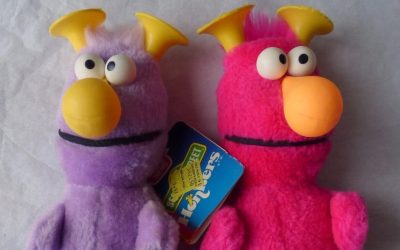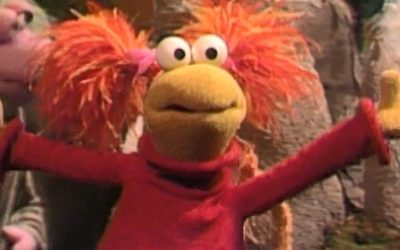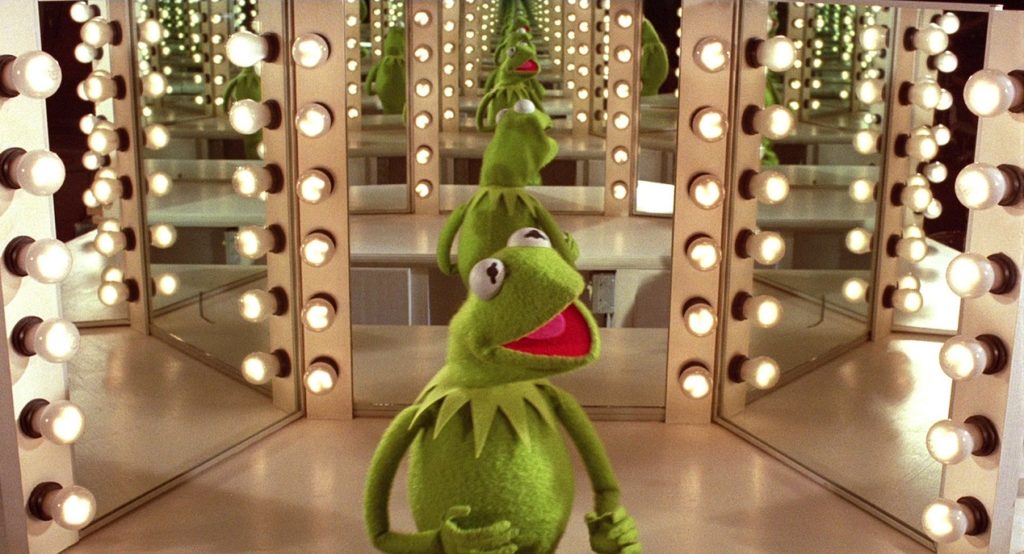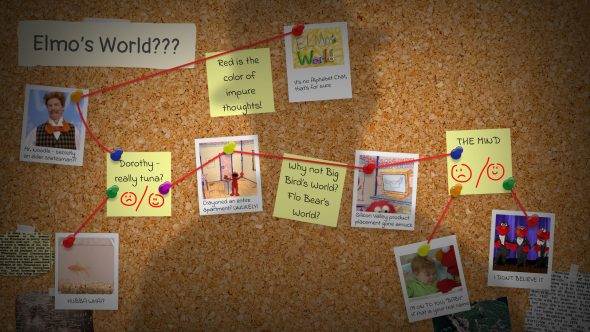
Let’s see…corkboard, string, unfocused photographs…oh, hello! I did not see you there! I’m just over here preparing to blow people’s minds by exposing a conspiracy nearly 26 years in the making. Ya’ know, normal Saturday night business.
What conspiracy am I a-tryin’ to bust open? Well, I’ll tells ya. It involves a certain furry, red monster and a supposed “world” of his. That’s right, I’m about to blow the lid off this whole “Elmo’s World” thing, and I hope I make enough sense to convince you I’m right, maybe. Are you ready to have your mind blown? Or at least, wafted? Don’t say I didn’t warn you, but here we go:
Elmo shouldn’t actually be able to learn anything in Elmo’s World.
That’s right! The whole segment is predicated on a false notion. Now here me out as I explain this in a completely rational, and probably-researched manner.
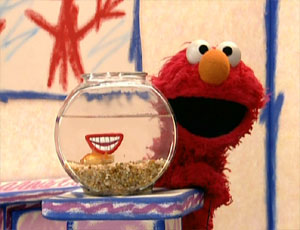
As you may know, each Elmo’s World segment shows Elmo learning about different things, from teeth to jackets to penguins. He accomplishes this with the help of Mr. Noodle, his Sesame pals, some sentient furniture, and most scholarly, a baby. As Elmo learns these things, so too should the young viewer at home.
But here’s the thing – Elmo should not be able to learn new information about teeth or penguins because he cannot. The world is his own imaginary creation, and as such, his mind can only be limited to what he already knows.
Sure, the subconscious mind may contain information that the conscious mind is not aware of, as demonstrated in that documentary about subliminal messaging, Josie and the Pussycats. But, Elmo’s World is an imaginary construct. Elmo is not there in a conscious way. If he is in Elmo’s World, his subconscious is taking over.
So, when he meets a talking book or kingfish, the information they impart on him should be of no surprise. Elmo already knows these facts about skin and bath time, otherwise, how could he imagine them? His mind cannot dispense factual information it does not otherwise already know.
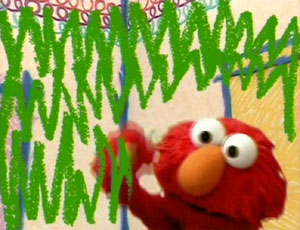
The question this raises is – why? Why does Elmo feel the need to retreat to a world in which he is ignorant? It is not uncommon to imagine oneself in their ideal situation to escape the harshness of our reality. A fantasy can be anything. In my imagination, I could be the best American president, a world-renowned violin player, or even the owner of a pretty cool hat. I cannot fathom why a young monster like Elmo would apply this limitless mental ability to imagine himself a simpleton.
Contrast this situation with Elmo’s notoriously less-intelligent friend, Grover. He truly lacks much knowledge, but he instead engages in the inverse: he purports himself in the fantasy of being smart, creating a space where his life can be an improvement of his own. He takes on the role of professor or super hero to give off the impression he is better than he is. And in his regular segment, “Global Grover,” he doesn’t evade reality to pretend to be dumb. He actually travels all over the world to educate himself, while Elmo remains at home using his mind to pretend he lacks one.
There’s nothing wrong with Elmo’s quest for knowledge; it’s what all sentient, intelligent beings should strive for. But, if Elmo truly wishes to learn things, he should consult your typical fonts of knowledge – older, experienced individuals, encyclopedic texts, and YouTube tutorials on how to do mundane tasks, not imaginary tornados or the intellectual gulf known as the Noodle Family. Escapism is not the way to true enlightenment.
In conclusion, Elmo’s World is inherently flawed and I hope somebody certainly gets fired for this continued blunder. Thank you. Now, if you’ll excuse me, I must get to my next project – unraveling the Freudian implications of Telly Monster becoming entangled with a monster named Juliet who looks just like his sister Mona.
Click here to sing The Conspiracy Theory Song on the Tough Pigs Discord!
By Shane Keating

